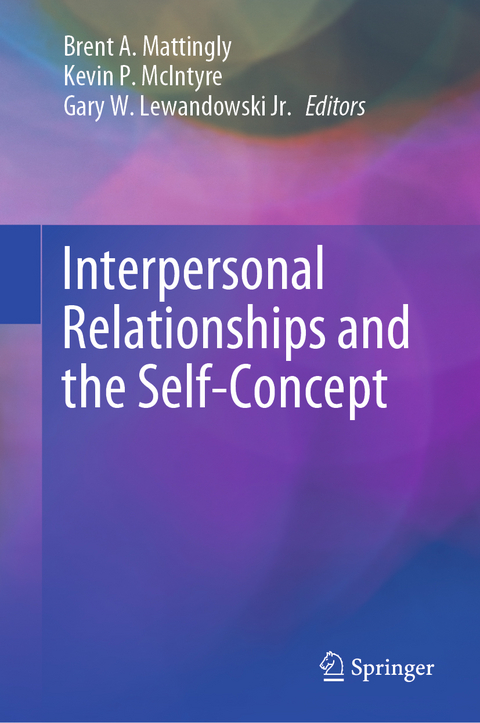
Interpersonal Relationships and the Self-Concept
Springer International Publishing (Verlag)
978-3-030-43746-6 (ISBN)
This volume provides an overview of the theoretical and empirical work on relationship-induced self-concept change that has occurred over the last 10-15 years. The chapters in this volume discuss the foundations of relationship self-change, how and when it occurs, how it influences relationship decisions and behavior, and how it informs and modifies subsequent knowledge structures, all examined over the course of the relationship cycle (i.e., initiation, maintenance, and dissolution). Additionally, this volume identifies novel applications and extensions of the relationship self-change literature, including applications to health and behavior, intergroup relations, and the workplace.
Among the topics discussed:
- Self-disclosure in the acquaintance process
- Commitment readiness
- Bolstering attachment security through close relationships
- Self-concept clarity and self-change
- The role of social support in promoting self-development
- Relationship dissolution and self-concept change
- Intergroup and sociocultural factors of self-expansion
- Self-concept change at work
- Measurement of relationship-induced self-concept change
Interpersonal Relationships and the Self-Concept serves both as a comprehensive overview of the existing empirical research as well as a roadmap for future research on self-change, including a discussion of emerging theoretical frameworks. It will interest researchers focusing on romantic relationships, self and identity, and the intersection of self and relationships, spanning the disciplines of psychology, sociology, communication, and family studies.
Brent A. Mattingly is an Associate Professor of Psychology at Ursinus College. His research focuses on the intersection of romantic relationships and the self. His recent work has centered on relationship-induced self-concept change and has explored how various forms of relational self-change are associated with relationship functioning. Kevin P. McIntyre is an Associate Professor of Psychology at Trinity University. His lab primarily conducts research on relationship-induced self-concept change and its implications for relationship functioning. He is currently on the advisory editorial board of the Journal of Social and Personal Relationships. Gary W. Lewandowski, Jr. is a Professor in the Department of Psychology at Monmouth University. His research focuses on the role of self in romantic relationships including such processes as: attraction, relationship initiation, relationship maintenance, infidelity, and break-up. His secondary area of research seeks to improve the pedagogy of teaching research methods and statistics.
1.Relationship-Induced Self-Concept Change: Theoretical Perspectives and Methodological Approaches.- 2.You Complete Me: Antecedents and Moderators of Relationship-Induced Self-Concept Change.- 3.Influence of Self-Disclosure in the Acquaintance Process on Changes in People's Self-Concept, How People Feel about Themselves, and How People Feel about Others.- 4.Commitment Readiness: Timing, the Self, and Close Relationships.- 5.Attachment Security Enhancement Model: Bolstering Attachment Security through Close Relationships.- 6.Who in the World Am I? Self-Concept Clarity and Self-Change in Relationships.- 7.Self-Authenticity and the Michelangelo Phenomenon.- 8.The Role of Social Support in Promoting Self-Development.- 9.Relationship Dissolution and Self-Concept Change.- 10.The Importance of Self-Concept and Self-Expansion in Understanding Health and Behavior Change.- 11.Self-Expansion: Intergroup and Sociocultural Factors.- 12.Self-Concept Change at Work: Characteristics and Consequences of Workplace Self-Expansion.- 13.Summary and Future Directions: Trajectories of Romantic Relationships and Self-Concept Change.
| Erscheinungsdatum | 23.05.2020 |
|---|---|
| Zusatzinfo | XII, 216 p. 5 illus., 1 illus. in color. |
| Verlagsort | Cham |
| Sprache | englisch |
| Maße | 155 x 235 mm |
| Gewicht | 512 g |
| Themenwelt | Geisteswissenschaften ► Psychologie ► Humanistische Psychotherapien |
| Geisteswissenschaften ► Psychologie ► Psychoanalyse / Tiefenpsychologie | |
| Schlagworte | Attachment as Antecedent to Self-Change • Attachment Security Enhancement Model (ASEM) • Commitment Receptivity and Cognitive Interdependen • Commitment Receptivity and Cognitive Interdependence • Health Consequences of Self-Change • How Self-Expansion Promotes Weight Loss and Smokin • How Self-Expansion Promotes Weight Loss and Smoking Cessation • Inclusion of Other in the Self Scale • Motivation as Antecedent to Self-Change • Relationship Dissolution and the Promotion Self-Ch • Relationship Dissolution and the Promotion Self-Change • Relationship-Induced Self-Concept Change • Relationship Receptivity Theory • Responsiveness to One's Own Self- Expansion Opport • Responsiveness to One’s Own Self- Expansion Opportunities • Role of Social Support in Promoting Self-Change • Romantic Desire as Antecedent to Self-Change • Self-Authenticity and the Michelangelo Phenomenon • Self-Change in Intergroup and Workplace Relationsh • Self-Change in Intergroup and Workplace Relationships/Settings • Self-Concept Clarity as Antecedent to Self-Change • Self-Disclosure and Closeness • Self-Expansion Model • Two-Dimensional Model |
| ISBN-10 | 3-030-43746-9 / 3030437469 |
| ISBN-13 | 978-3-030-43746-6 / 9783030437466 |
| Zustand | Neuware |
| Haben Sie eine Frage zum Produkt? |
aus dem Bereich


